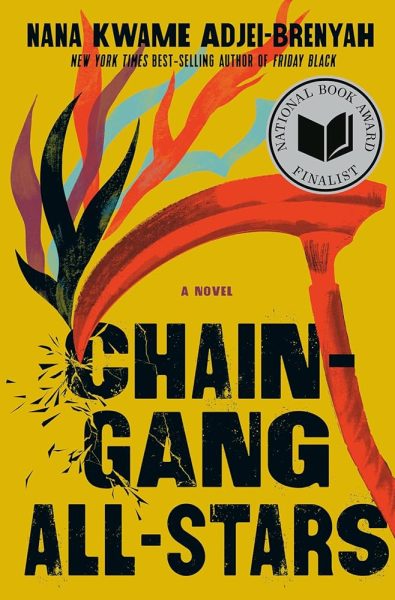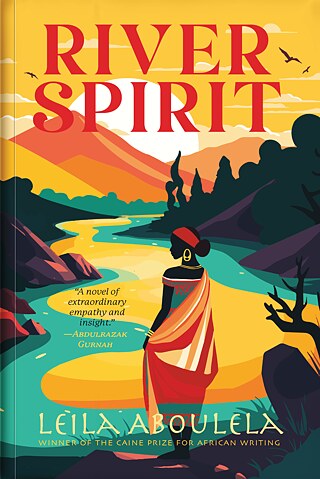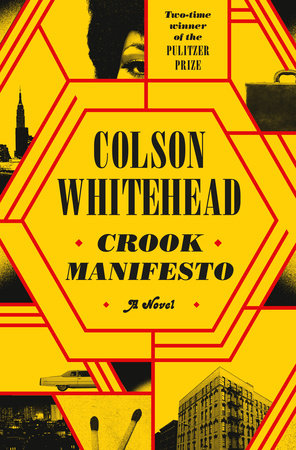As the year reaches its epilogue, the literary world has produced many popular new tales in the fiction genre. These three award-winning novels center Black characters and are set in captivating historic periods and dystopian alternate realities.
“Chain Gang All Stars” by Nana Kwame Adjei-Brenyah

Imagine if prison was a cross between WWE and the Hunger Games. That is the world of “Chain Gang All Stars,” using hyperbolic exploitation to represent issues within the prison industrial complex. The phrase “chain gang” historically refers to when prisoners used to be chained together to perform labor in the post-slavery period in the U.S. With the brutal nature of U.S. prisons in mind, it’s understandable where the idea in “Chain Gang All Stars” comes from. Convicted murderers are put in gladiator rings to battle against each other, while an audience watches on. Winners receive prizes from fans, and if they win for over three years, they’re granted an end to their sentence.
With such a dark premise and the opening chapters containing bloodbaths, the main characters are not your typical heroes. But Adjei-Bruneh managed to make each of the characters understandable. The relationship between protagonist Loretta Thurwar and her girlfriend humanizes their issues and internal conflict at being in the death matches. Even knowing they are murderers, we see how the prisoners try to band together to go on strike against the tournament, in a way that’s almost analogous to prison protests in real life. Despite that uplifting note, the graphic violence and action movie tropes were so over-the-top that it’s hard to take the underlying theme of prisoner rights issues seriously.
This story is a better analogy to sports and entertainment culture. A world where actors, artists, and athletes are plastered with advertisements and traded for millions between teams, profiting off the demanding and competitive nature of fans. “Chain Gang All Stars” packs captivating twists and gut punches in every page, though the deeper commentary on prison reform issues is overshadowed by the violent action movie dystopian premise.
“River Spirit” by Leila Abulela

This historical fiction novel is based on actual events of a Sudanese anticolonial rebel movement, called the Mahdists, during the 1880s against Ottoman and British rulers. The story centers on Akuany ZamZam, a Sudanese girl, tracing her freedom as a child in a White Nile river village to her captivity in adult life under Ottoman and British elites. Much of Akuany’s struggles are against the backdrop of the Mahdist rebellion, as Akuany’s loved ones struggle to choose whether they should support the fringe rebel group or side with the ruling elite.
This book is captivating from start to finish, utilizing five main interconnected narrators to tell a central story about how they live through the upheaval. Abulela excels at not muddling the character’s voices and keeping the chronology organized. This strong writing helps to make all the characters realistic, especially the women who are central to the story and take hold of their fates, even as they face societal challenges.
The flowery descriptions of Sudanese culture, the old city of Khartoum, and the Sudanese countryside were evocative. You get a feel for the opulence of Silk Road-esque trading, as well as the Islamic intellectual era. Without some essential knowledge of Muslim religious practices, readers may feel lost by some of the events and character motives in the book. Abulela’s book is a heartfelt tribute to the intertwined, and at times oppositional, histories of Egypt and Sudan – her parents’ homelands.
There were parallels between the Sudanese historical events in this story to what I know about India, my own family’s country, at that time. It signifies a period when a lot of the world was going through upheaval, either by colonialism or internal corruption, and how people found the strength to stage their revolutions through their religious symbols of a savior or messiah. It’s also tragic to read the descriptions of the slave trade and imperial oppression, and how cultural communities that were supposed to hold each other together would collapse from the greed of wealth and political power.
This was not long ago – only four or five generations of people separate the history of this novel from Sudan’s eventual independence from Britain in the 1990s and the ongoing conflicts they have faced. Learning about these specific historical periods can be eye-opening to understand their global contemporary impact, and Abulela manages to write this history poignantly in “Water Spirit.”
“Crook Manifesto” by Colson Whitehead

This crime fiction novel is a sequel to Whitehead’s “Harlem Shuffle,” about a Black father in 1960s Harlem, who tries his best to avoid getting involved with the underground network of petty crime. Unfortunately, “Crook Manifesto” prolongs many of the writing flaws in its predecessor. The writing style used in these books is almost like an old person telling you a meandering story laced with random, mundane details. It can be pretty funny to read, but not in a way that compels you to read page after page in one sitting.
For a story about eccentric criminals and their comical heists, this narrative style takes all the urgency out of the plot. Whitehead seems to intentionally use the “stream of consciousness” narrative to create a semi-biographical account of protagonist Ray Carney’s life and his criminal misadventures. But the plot fails to create any urgency to finish the story and get to the bottom of the different mysteries playing out. It’s not like a mystery or crime novel. It’s more like a casual late-night TV show.
This trilogy is also a tribute to the Blaxploitation genre of television that was popular in the 1960s to 1980s and concentrated on drama and action movies centering on Black protagonists. Whitehead uses gritty descriptions of New York City and Harlem to instill that urban chaos factor.
“Business, orderly business, unfolded inside the walls of Carney’s Furniture, but out on the street it was Harlem rules: rowdy, unpredictable, more trifling than a loser uncle,” Whitehead writes. “The sirens zipped up and down the avenues as regularly as subway trains, all hours, per calamity’s timetable. If not the cops on a mayhem mission, then an ambulance racing to unwind fate. A fire engine speeding to a vacant tenement before the blaze ate the whole block, or en route to a six-story building kerosened for the insurance, a dozen families inside.”
Whitehead pays homage to the rundown urban blocks and old brownstone apartments that house most New Yorkers but aren’t part of the popular picture of New York City fame and glamor that some people may have. This story also gets deep into the political corruption aspect and the way some lives are seen as disposable.
Still, the unserious treatment of the characters fails to generate any sympathy for Carney’s various blunders or his cartoonish associates. However, “Crook Manifesto” is still a fun read, especially with Whitehead’s sardonic humor and clever dialogue revolving around Carney’s quirky and convoluted misadventures.
I would also highly recommend Whitehead’s other books, some of which are available in the COD Library. “River Spirit” and “Chain Gang All Stars” are also at the COD Library, if you want to read some deeply resonating works of realistic fiction over winter break.







